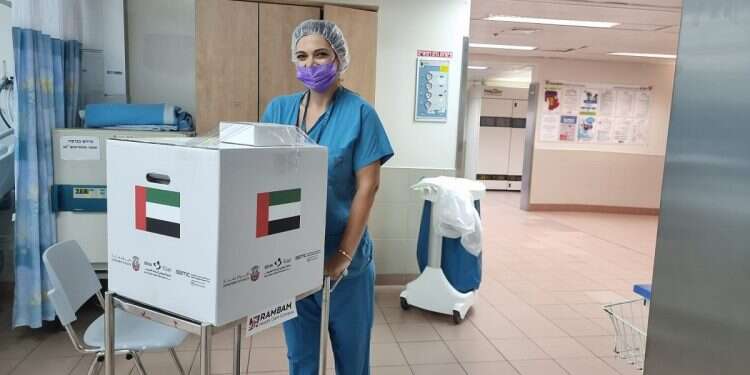Doctors and donors from Israel and the United Arab Emirates have completed a historic series of kidney transplants that has saved the lives of three women suffering from kidney disease.
Follow Israel Hayom on Facebook and Twitter
The procedures, the first ever between Israel and the UAE, are the result of a collaboration between the Alliance for Paired Kidney Donation (APKD) the UAE Organ Donation and Transplant Committee, and the Israel National Transplant Center.
The complicated exchange involved three kidney patients, two from Israel and one from the UAE, in a "pay-it-forward" series of transplants. Each patient had a willing, living donor whose kidney was not a match for them, but did match another patient. So they helped each other: An Abu Dhabi-based donor gave a kidney to a patient from Israel whose husband did not match. The husband donated one of his kidneys to a patient at another hospital in Israel, and in turn that patient's incompatible donor, her daughter, donated her kidney, where it was transplanted into the original Emirati donor's mother.
The transplants involved six surgeries and three hospitals. Kidneys were shipped between Abu Dhabi and Tel Aviv via private jet.
Kidney disease is a leading cause of death around the world. While dialysis helps, kidney transplantation is the only cure once the kidney has failed. Kidney failure patients often have living donors willing to help, only to learn the patient and donor are incompatible, ruling out the possibility of a transplant.
This "kidney diplomacy" is being hailed for saving three lives were saved, helping form valuable relationships, and contribute to new organ transplant regulations. Nations around the world often prohibit transplants among unrelated people in an outdated effort to prevent the black market sale of organs, rules that can block life-saving paired exchanges. Even the US and Canada cannot exchange kidneys across their common border.
"This exchange demonstrates how we can harness our differences for mutual benefit," said Dr. Michael Rees, PhD, chief executive officer of APKD and one of the world's foremost authorities on paired kidney exchange.
"APKD was created to lead innovation in the living donor kidney space, and we hope to connect the world to save more lives through kidney transplantation," Rees said.
APKD provides a global kidney registry for donors powered by a Nobel prize-winning algorithm of Dr. Alvin Roth of Stanford University. Itai Ashlagi, Stanford associate professor, is now helping APKD improve its algorithms, and his work helped make the Israel-UAE living donor exchanges possible.
Subscribe to Israel Hayom's daily newsletter and never miss our top stories!




